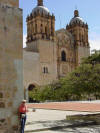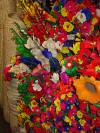|
Oaxaca
Travel Info
If you go . . . here are a
few practical ideas that worked for us:
Guidebooks
The best we have found are
the ones from Lonely Planet and Moon.
 Lonely
Planet publishes a guide to Mexico, which shows its backpacker heritage in
all the “how to eat vegetarian for $2 a day” and “feel guilty if you used
any hydrocarbons to get here” material, but still the most comprehensive
guide overall. To travel light, we cut out the pages on the region we’re
visiting and leave the heavy book at home. Lonely
Planet publishes a guide to Mexico, which shows its backpacker heritage in
all the “how to eat vegetarian for $2 a day” and “feel guilty if you used
any hydrocarbons to get here” material, but still the most comprehensive
guide overall. To travel light, we cut out the pages on the region we’re
visiting and leave the heavy book at home.
Moon Publications has three
excellent guidebooks to Mexico that we carry aboard Raven.
Archaeological Mexico by Alexander Coe is detailed enough on each
site, without being overwhelming. Colonial Mexico concentrates on
seventeen cities whose histories date back to early Spanish colonial days.
Pacific Mexico Handbook is a general coverage guide for the Pacific
coastal area, and includes Oaxaca. Moon has several guides to other
regions of Mexico, which have coverage as good as Lonely Planet and are
easier to carry.
Travel
We flew Mexicana Air from
Puerto Vallarta to Oaxaca, changing planes in Mexico City. The planes were
seemingly new, comfortable Fokker 100 jets, which left and arrived on time
for all our flights both ways. There are several flights a day in each
direction. We were very happy with the service.
Hotels
 El
Camino Real is The hotel in Oaxaca, with prices to match. It’s
close to the zócalo (central plaza) in a beautifully-restored
convent, with courtyards, gardens, pools, painted ceilings, even
ecclesiastical chants playing softly in the background at the restaurants.
We couldn’t get a reservation because of all the people from Mexico City
coming in for the weekend, so we stayed at the very nice Hostal de la
Noria, in an attractive old home with a central courtyard. In any case, do
ask for a quiet room, as the traffic can be quite noisy in the central
part of the city. Staying in the centro offers the advantage of
being able to walk around town and in the zócalo anytime, without
having to take shuttle buses. El
Camino Real is The hotel in Oaxaca, with prices to match. It’s
close to the zócalo (central plaza) in a beautifully-restored
convent, with courtyards, gardens, pools, painted ceilings, even
ecclesiastical chants playing softly in the background at the restaurants.
We couldn’t get a reservation because of all the people from Mexico City
coming in for the weekend, so we stayed at the very nice Hostal de la
Noria, in an attractive old home with a central courtyard. In any case, do
ask for a quiet room, as the traffic can be quite noisy in the central
part of the city. Staying in the centro offers the advantage of
being able to walk around town and in the zócalo anytime, without
having to take shuttle buses.
Markets
 The
big Saturday morning market in Oaxaca is not to be missed, for its
enormous variety and sheer size. Must be a couple of thousand stalls and
vendors. But the best market we went to, as described in the Oaxaca page,
was in a nearby pueblo named Ocotlán. The pueblos
surrounding Oaxaca have their markets on different days. The Dominican
monks set up the system centuries ago, so the campesinos could
always find places to sell their wares. Here’s a partial list, which you
can correlate with the crafts list below: The
big Saturday morning market in Oaxaca is not to be missed, for its
enormous variety and sheer size. Must be a couple of thousand stalls and
vendors. But the best market we went to, as described in the Oaxaca page,
was in a nearby pueblo named Ocotlán. The pueblos
surrounding Oaxaca have their markets on different days. The Dominican
monks set up the system centuries ago, so the campesinos could
always find places to sell their wares. Here’s a partial list, which you
can correlate with the crafts list below:
Zimatlan
Wednesday
San Pedro y San Pablo Wednesday
Zaachila Thursday
Ocotlán Friday
Teotitlán del Valle Saturday
Tlacolula Sunday
Handicrafts
 Within
the city of Oaxaca, there are many shops selling the handicrafts that the
region is so famous for. Do shop around for the best quality; after a few
shop visits, you will begin to notice the differences. The best two shops
we found are: Within
the city of Oaxaca, there are many shops selling the handicrafts that the
region is so famous for. Do shop around for the best quality; after a few
shop visits, you will begin to notice the differences. The best two shops
we found are:
La Mano Mágica (not a
misspelling; mano is a feminine noun), 203 Alcala, a couple of
blocks from the zócalo. Has the best quality and often the highest
prices, but it’s mostly worth the premium.
ARIPO, 809 Garcia
Vigil, several blocks uphill from the zócalo, but well worth the
walk. This one is run by the state government and has a massive inventory.
Prices and quality vary, and there are lots of good buys. Seems to be
wholesale-oriented, but also welcomes retail shoppers.
The Mercado de Artesanías,
Garcia & Zaragoza, is touristy but comprehensive, especially if you can’t
get out to the pueblos.
The surrounding pueblos
have their specialties in crafts, too:
Arrazola
- Alebrijes: fanciful carved animals, brightly painted
Ocotlán - Knives, cutlery, clay figures by the
Aguilar sisters, green pottery
Santo Tomas Jalieza - Colorful weavings of all types (wonderful)
Tlacolula - Mescal (liquor distilled from
maguey)
San B. Coyotepec - Black pottery
This page was last
updated on
04/13/04. |